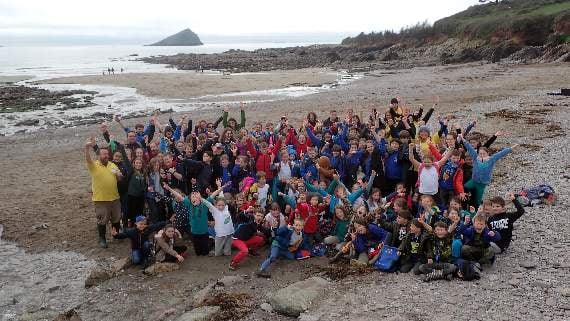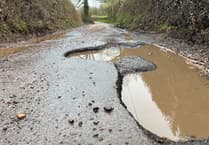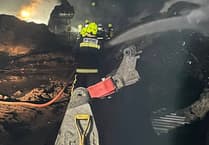An ongoing project aimed at getting students to acts as champions for their environment recently held its second annual beach conference.
The Marine Wildlife Champions project, led by the education team at Devon Wildlife Trust and sponsored by South West Water, focuses on increasing knowledge and understanding of the marine environment and the challenges it faces.
The project is hoped to inspire students to take the lead in affecting behavioural change in their community.
The MWCP is made up of 10 schools around Devon, five of which are from the South Hams, including Kingsbridge Community College, Thurlestone Primary, Salcombe Primary, Manor Primary in Ivybridge and Sparkwell Primary.
Each school has a team of 10 students who are identified as lead ‘champions’ of the project, who will then decide what it is their school will work on for it.
DWT’s marine education officer, Coral Smith, spent a day with each of the teams educating them about the five current environmental challenges relating to marine life: terrestrial pollution; plastic waste; climate change/ocean acidification; overfishing; and the protection of the sea.
After Coral’s visit, the students were challenged to develop a project within the school, at home or in the local community which will have measurable outcomes for the good of marine life.
As part of the project, a beach conference was held at Devon Wildlife Trust’s Wembury Marine Centre, where the champions learned from experts such as the National Marine Aquarium and the Shark Trust.
Students spent the day exploring rock pools, dissecting marine animals and learning firsthand about the issues they’re working on for their projects.
Nine-year-old Abby from Sparkwell Primary said: “My favourite part of the day was looking through the contents of a sea creature’s stomach to see what they eat as I hadn’t done that before - it wasn’t nice seeing plastic in there. I learned that some fish can camouflage themselves in the rock pools and ocean.”
Ruby, 10, also from Sparkwell Primary said: “I loved the rockpooling because you can get really close to the animals and I saw lots of different creatures like a starfish and anemone.
“I learned that climate change is making marine animals head north to find colder water and this means some may become extinct as they can’t find the right food.”
Mrs McLoughlin, teacher at Sparkwell Primary, said: “The day was well organised with some excellent activities to help the children think about the consequences of climate change and marine pollution.”
Daisy Hayhurst, from Kingsbridge Community College, said: "It was a really fun day - the beach was really pretty. I liked the rock pooling best and found a hermit crab."
Tabby Minty, also from KCC, said: "The day was really interesting. I learnt new things about sharks and was able to look at and hold a shark fin and jaw, however I did fall into a rock pool!"
Lucy, from Manor Primary’s eco club, said she thought the day went really well and has learnt a lot from it. She said she particularly enjoyed the rock pooling because they found out about a lot of different creatures, but she did fall in!
Salcombe Primary’s ‘Starfish and Lobster’ classes had eight pupils attend the conference as the school’s champions.
Eight-year-old Ava said: “I enjoyed everything! But my favourite bit was looking inside the stomach of a marine mammal – it was disgusting – we found squid, shrimps, muscles but also plastic stuff like bottle tops and cotton buds.
“I liked learning about how we can help save animals from plastic and what we can do to help keep them safe in the sea.”
Jayme, from Salcombe’s Lobster class said: “The best bit was exploring in the rock pools – we found many different creatures such as: Crabs, bearded rocklings, shrimps, cushion start fish and a weird green leaf worm crawling across the rocks.
“I told my dad about the day and we watched a video about the ellipsis shark. For our school project we are going to help reduce global warming.”
Mr Nott accompanied the pupils from Salcombe on the day and said: “The project really helps build our pupils knowledge and understanding of some of the issues that face our seas.
“It was fantastic to see how engaged the pupils were with all the activities. The pupils are now thinking of ways to share their knowledge and solutions with the rest of the school and the wider community.”
The Marine Wildlife Champions are now preparing to present their projects in front of local dignitaries and marine experts at the National Marine Aquarium in Plymouth in June.





Comments
This article has no comments yet. Be the first to leave a comment.